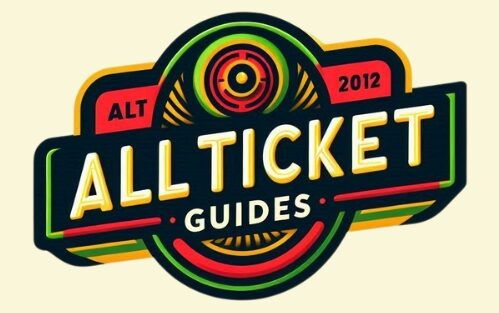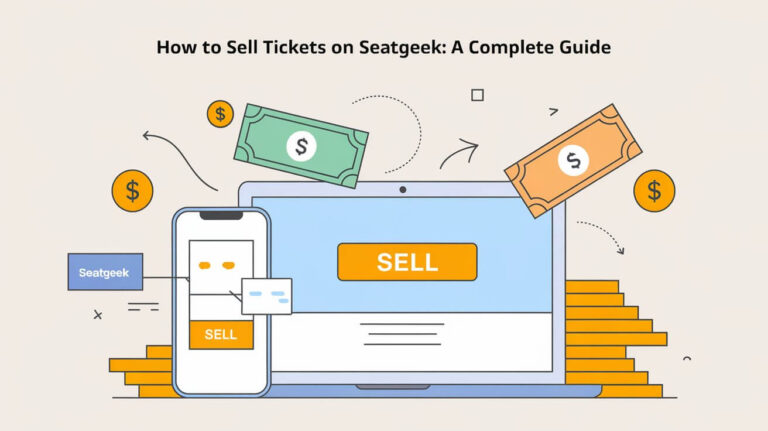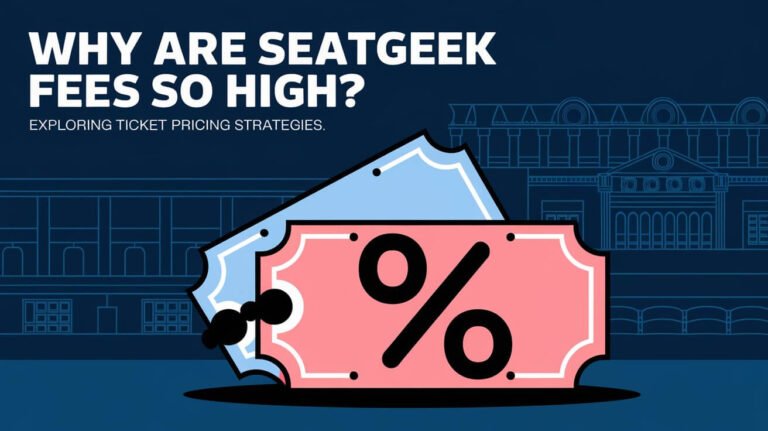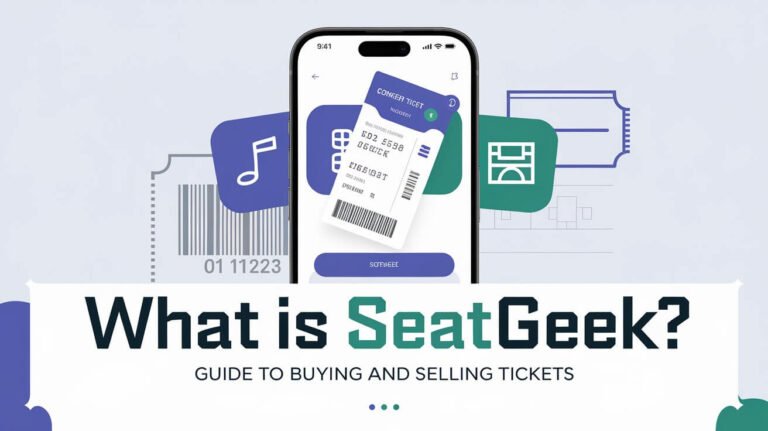Detailed Guide to Understanding SeatGeek Fees in 2024

When buying tickets for your favorite events, understanding the fees associated with your purchase is essential. SeatGeek, a popular ticket resale platform, has a fee structure that can sometimes be confusing. In this article, we will break down everything you need to know about SeatGeek fees in 2024, including service fees, delivery fees, and taxes. We will also provide tips on how to minimize these costs and compare SeatGeek’s fees with other ticket platforms.
What Are SeatGeek Fees?
Overview of SeatGeek Fees
SeatGeek fees are additional costs that buyers and sellers incur when using the platform. These fees are typically divided into three main categories:
- Service Fees: These cover the operational costs of SeatGeek.
- Delivery Fees: These apply to the method chosen to deliver tickets.
- Taxes and Additional Costs: These include any applicable sales tax and other minor charges.
Breakdown of SeatGeek Service Fees
Service fees are a significant part of the total cost on SeatGeek. These fees are typically around 10% to 15% of the ticket price. The exact percentage can vary based on several factors, including the type of event, the demand for tickets, and the seller’s pricing strategy.
How Service Fees Are Calculated
SeatGeek uses an algorithm to adjust service fees based on market demand and supply. This means that during high-demand events, service fees might be higher, while for less popular events, the fees could be lower. This dynamic pricing helps SeatGeek manage ticket availability and ensure a fair marketplace for both buyers and sellers.
Delivery Fees on SeatGeek
Delivery fees are another cost to consider when purchasing tickets. These fees vary depending on the delivery method chosen.
Types of Delivery Fees
- Electronic Delivery: This method is usually cheaper, with costs ranging from $5 to $10 per order.
- Physical Delivery: This method is more expensive due to shipping and handling costs.
Variations in Delivery Fees
The cost of delivery also depends on the buyer’s location. Domestic deliveries (within the US) are generally cheaper than international deliveries. Additionally, opting for electronic delivery can save you money compared to physical delivery, which includes mailing or courier charges.
Taxes and Other Additional Costs
Taxes are applied based on the event location and ticket value. These taxes are calculated as a percentage of the ticket’s face value and any applicable fees. It’s essential to consider these additional costs when budgeting for your ticket purchase.
Why Are SeatGeek Fees Applied?
SeatGeek applies these fees to cover various operational costs. These include:
- Paying commissions to sellers listing their tickets.
- Covering fees for payment processors.
- Paying sales taxes to the government.
- Supporting the technology and infrastructure of SeatGeek’s platform.
- Funding marketing and advertising efforts.
All these costs add up, and SeatGeek must balance them to provide a seamless user experience while maintaining profitability.
How to View SeatGeek Fees Before Purchase
SeatGeek provides a feature that allows users to view ticket prices with fees included. This feature helps you understand the total cost before finalizing your purchase.
Using the Fee Calculator
SeatGeek’s fee calculator is a handy tool to estimate your total costs. Here’s how to use it:
- Go to seatgeek.com/fees.
- Enter the event name or URL in the search box.
- Select the number of tickets and the price range.
- Click on “Calculate Fees.”
- Review the breakdown of fees and taxes.
This calculator gives you a clear picture of what you will pay, including all service and delivery fees.
Examples of SeatGeek Fee Calculations
To illustrate how SeatGeek fees work, let’s look at two hypothetical scenarios:
Scenario 1: Concert in New York
- Two tickets for $50 each:
- Service fee: 15% of $100 = $15
- Delivery fee: $5 (electronic)
- Total fee: $20
- Final price: $120
Scenario 2: Sports Event in Los Angeles
- Two tickets for $40 each:
- Service fee: 15% of $80 = $12
- Delivery fee: $10 (physical)
- Total fee: $22
- Final price: $102
In both scenarios, the service and delivery fees significantly impact the final price. This is why it’s crucial to understand these fees before purchasing.
Comparing SeatGeek Fees with Other Platforms
SeatGeek’s fees are competitive compared to other ticket platforms. One of the advantages of using SeatGeek is its transparency in showing the final price, including all fees. This feature allows users to compare prices across different sellers and platforms without hidden charges.
Competitive Analysis
While SeatGeek fees might seem high, they often include additional benefits like a price match guarantee. This guarantee means if you find a lower price for the same tickets elsewhere, SeatGeek will refund the difference. This policy helps ensure that you get the best deal available.
Strategies to Minimize SeatGeek Fees
While fees are a part of any ticket purchase, there are ways to reduce these costs on SeatGeek.
Tips and Tricks
- Use Promo Codes: SeatGeek occasionally offers promo codes that provide discounts or waive certain fees. Subscribe to their newsletter or follow their social media pages to stay updated on these offers.
- Opt for Electronic Delivery: Choosing electronic delivery can save you money compared to physical delivery.
- Buy from Verified Sellers: Tickets from verified sellers often have lower service fees, and you can trust their legitimacy.
Utilizing SeatGeek Features
SeatGeek offers a “Show prices with fees” option that can be turned on while browsing for tickets. This feature allows you to see the total cost, including estimated fees, which helps in making an informed decision.
Common Questions About SeatGeek Fees
Here are some frequently asked questions about SeatGeek fees:
Why Do Fees Vary?
Fees on SeatGeek vary due to factors like market demand, event popularity, and seller pricing strategies. The platform uses these variables to adjust fees dynamically, ensuring a balanced marketplace.
How Can I See the Final Price?
You can see the final price, including all fees, by enabling the “Show prices with fees” feature in SeatGeek’s filters. This option provides a clear view of the total cost, helping you avoid surprises at checkout.
What Are the Refund Policies Regarding Fees?
SeatGeek’s refund policies vary depending on the event and ticket type. Generally, service and delivery fees are non-refundable unless the event is canceled. Always check SeatGeek’s refund policy before making a purchase.
Additional Sections to Increase Length and Value
How SeatGeek Compares to Other Ticket Resale Platforms
A comparison of SeatGeek with other popular ticket resale platforms like StubHub and Ticketmaster can provide additional insights. Discuss the differences in fee structures, user interfaces, and overall user experiences.
The Impact of SeatGeek Fees on Event Attendance
Explore how fees influence people’s decisions to attend events. High fees can be a deterrent, while transparent pricing can encourage more ticket purchases.
Tips for First-Time SeatGeek Users
Provide a beginner’s guide for new users, explaining how to navigate the platform, find the best deals, and understand the fee structure. This section can include step-by-step instructions and screenshots.
User Reviews and Experiences
Share user testimonials and reviews about their experiences with SeatGeek fees. Real-life examples can add credibility and provide practical insights.
The Future of Ticket Fees
Discuss potential trends in ticketing fees, such as changes due to new regulations or technological advancements. This section can speculate on how these changes might impact SeatGeek’s fee structure in the future.
SeatGeek’s Customer Service and Support
Detail SeatGeek’s customer service options for users facing issues with fees or ticket purchases. This can include contact methods, response times, and user experiences.
How to Sell Tickets on SeatGeek
Explain the process of selling tickets on SeatGeek, including the fees sellers must pay. This can provide a comprehensive view of the platform from both buyer and seller perspectives.
The Environmental Impact of Digital vs. Physical Tickets
Discuss the environmental benefits of choosing electronic delivery over physical tickets. This can appeal to eco-conscious readers and highlight an additional benefit of minimizing delivery fees.
Conclusion
Understanding SeatGeek fees is crucial for making informed ticket purchases. By knowing how these fees are calculated and how to minimize them, you can enjoy your favorite events without breaking the bank. Use the tips and strategies provided to make the most of your SeatGeek experience and always check for the final price before completing your purchase. Happy ticket hunting!






